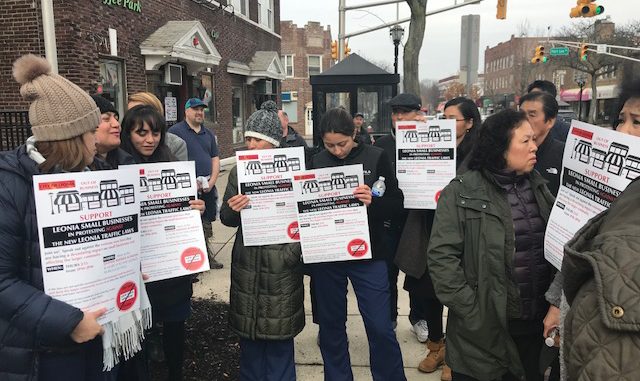
BY MICHAEL OLOHAN
OF NORTHERN VALLEY PRESS
ENGLEWOOD, NJ—Following a rebuke from the state attorney general’s office in mid-March that Leonia’s extensive road closures are “legally invalid” and the municipality “should immediately refrain from enforcing them,” Englewood officials say the neighboring borough continues to keep streets closed seven days a week and appears willing to flout the legal opinion of the state’s top law enforcement official.In January, after adopting an ordinance, Leonia closed 60 streets to non-borough residents from 6 to 10 a.m. and 4 to 9 p.m., seven days a week.
Leonia officials said then closures were necessary to redirect traffic to main roads, and reduce traffic on side streets that became clogged with motorists redirected by traffic apps, such as Waze and Google Maps, during tie-ups at the George Washington Bridge.
Englewood impacts
Some Englewood residents living on streets near Leonia experienced problems immediately—including being stopped by Leonia police officers—and have raised concerns for months that the closures limited their ability to freely travel between communities and have led to choking traffic on busy nights and weekends that made local travel, such as exiting driveways and traversing side streets, increasingly difficult.
Grewal: ‘legally invalid’
State Attorney General Gurbir Grewal, a former Bergen County prosecutor, replied March 16 via email and regular mail to Leonia’s borough attorney that the ordinances passed “restricting certain traffic from streets within the borough are legally invalid and the borough should immediately refrain from enforcing them.”
Grewal’s letter says that the state Department of Transportation commissioner “must approve any municipal ordinance, resolution or regulation concerning, regulating or governing traffic or traffic conditions.”
Grewal wrote the DOT commissioner may only approve such if it “shall appear to be in the interest of safety and the expedition of traffic on the public highways.”
Grewal’s letter cites a prior formal attorney general opinion that concluded “there is no inherent power vested in a municipality by which it may legally restrict the right of the public to the free use of streets and roads.”
The state attorney general notes Leonia “lacked the authority to enforce the ordinances that restrict the traffic on its roadways without authority from the Legislature or approval from the (DOT) Commissioner” under state law.
‘Appropriate action’
“We therefore direct that you advise [Leonia] to immediately refrain from enforcing the above referenced ordinances or the Attorney General will be required to take appropriate action to enforce the law,” wrote Grewal to Leonia’s borough attorney Brian Chewcaskie.
In addition, Grewal’s letter encourages Leonia officials to meet with state DOT officials “to discuss a lawful resolution of whatever traffic problems may exist…as the result of commuters traveling through Leonia to use the George Washington Bridge.”
The attorney general’s legal response to Leonia came to light when state Assemblyman Gordon Johnson asked Grewal about Leonia’s road closures during a legislative budget hearing May 2 in Trenton.
Englewood reaction
On March 20, without knowledge of the attorney general’s letter to Leonia, the Englewood City Council approved hiring a special counsel, Donald Klein, of Weiner Law Group, Parsippany, to handle legal matters related to Englewood’s challenge of Leonia’s road closures.
Following the special counsel’s hiring, Assemblyman Johnson helped facilitate meetings that included Englewood, Leonia, and state DOT representatives. Council members have not provided updates about the issue since hiring special counsel in March.
“They actually don’t care about enforcement, their only goal was to get motorists redirected around Leonia,” said Councilwoman Cheryl Rosenberg who opposed the closures when first begun.
“Obviously, we’re thrilled with the attorney general’s letter…but the [traffic] backups and problems affecting Englewood are still happening,” she said.
Rosenberg said she believed that Leonia’s intention in closing roads during certain hours was to get the traffic apps to show its side streets closed off to traffic, and to do that they passed an ordinance, put up signs, and stopped motorists.
“They’re not going to do it, without being compelled to do it,” Rosenberg said, regarding removing signs restricting local traffic per the attorney general’s opinion. “They actually don’t care.”
“I’m ecstatic, with our meetings on this in Trenton, we made our case,” said Councilman Michael Cohen, who represents the ward adjacent to Leonia. “This is a regional issue and should be dealt with regionally.”
He said the closures had a “major impact” on his ward’s residents.
“As long as you unilaterally act and cause detrimental impacts to our residents, we will work to obstruct such efforts,” Cohen said.
Following release of Grewal’s opinion, Leonia Mayor Judah Zeigler cited a 1977 Supreme Court decision and 2008 state statute that he believes provides municipalities more legal jurisdiction to regulate traffic on local streets.
The mayor noted a “media circus” was created by Grewal’s letter, Englewood’s legal fight against the closures, and Assemblyman Johnson’s intervention and public criticism of the closures.
He told an online news site that Leonia does not plan to repeal its ordinance restricting non-resident traffic during certain hours to main roads.
‘Don’t know why…’
“There’s no issue here. I don’t know why the attorney general has decided to insert himself into the process. Maybe they were hoping we’d get all ‘quakey’ here because the big bad attorney general has sent us a letter,” said Zeigler.
He said he questioned why the letter was only sent to Leonia’s borough attorney and not copied to anyone else.
He also questioned why the attorney general’s letter was raised during a legislative budget hearing by Assemblyman Johnson and he reminded Johnson that he also represents Leonia.
Zeigler said the ordinance restricting non-resident traffic is important to enhance public safety and protect local youngsters walking or crossing borough streets. “We respectfully disagree with the attorney general,” he said.
“I resent the behavior of [Assemblyman] Johnson and the behavior of the attorney general. He has no standing here and I submit he’s wrong,” Zeigler added.
